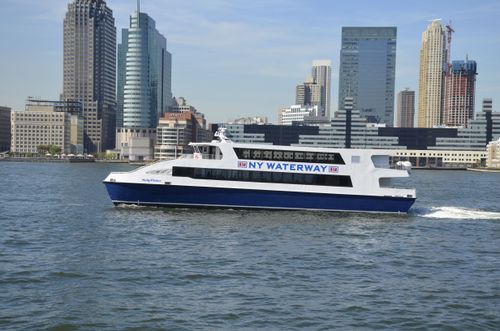NY Waterway completes renewable diesel trial, moves forward with significant conversion to cleaner energy source

SOURCE: NY Waterway
November 15, 2024
BY NY Waterway
NY Waterway, which operates the largest ferry fleet between New Jersey and New York, announced on Nov. 11 that it has completed its trial of renewable diesel fuel and is moving forward with efforts to transition a significant portion of its fuel usage to this renewable, cleaner energy source. This initiative complements a fleetwide hybrid/electrification program that will begin conversion of NY Waterway ferries in the middle of 2025.
NY Waterway began its renewable diesel trial this past July on selected ferries and is currently on track to use 375,000 gallons over the next year -- roughly 20% of the fleet’s fuel consumption, with a goal to increase to 50% usage in the near future. Renewable diesel is fully compatible with all its ferry diesel engines, requiring no modifications.
Renewable diesel fuel, made from various fats, oils and waste products from the food and restaurant industries, performs as well as fossil diesel, but with a significantly reduced environmental impact. The EPA estimates that using renewable diesel can lower greenhouse gas emissions by up to 78% per gallon. Because it burns so much cleaner, renewable diesel also results in reduced engine maintenance, contributing to enhanced service reliability.
Advertisement
“We are prioritizing the conversion of our fleet and fuel in order to minimize the impact on the environment and the communities we serve, without compromising on safety, speed or reliability,” said NY Waterway President and CEO Armand Pohan. “We’re fully committed to being a leader in the broader effort to make New York’s vital waterways even cleaner and greener for everyone.”
Earlier this month, NY Waterway’s new fifteen-year operating agreement with the Port Authority of NY/NJ for the Hoboken New Jersey Transit Terminal to Brookfield Ferry Service route went into effect. Beginning on Nov. 4, NY Waterway will increase service on this route to every 10-minutes during peak, weekday morning and evening times.
Advertisement
Related Stories
To further strengthen their collaboration on reducing emissions in logistics, DHL Group and Neste have agreed to jointly evaluate how Neste’s renewable solutions, such as renewable diesel and SAF, can support DHL in its decarbonization targets.
Avfuel Corp. on Jan. 31 announced it is expanding the availability of sustainable aviation fuel (SAF) by offering the fuel at three additional supply terminals located in Linden, New Jersey; Pasadena, Texas; and Florida’s Port Everglades.
Moeve and Norwegian signed a contract to accelerate the decarbonization of air transport between Spain and the Nordic region by promoting SAF. Moeve produces SAF at its La Rábida Energy Park (Huelva) from used cooking oils.
The Singapore Airlines (SIA) Group has signed a memorandum of understanding (MoU) to potentially source neat sustainable aviation fuel (SAF) from Aether Fuels, which plans to commence production in five years.
DHL Express has signed a deal with Cosmo Oil Marketing Co. Ltd. for the purchase of sustainable aviation fuel (SAF) to drive emission-reduced air freight in Japan. The deal represents an annual purchase of 7.2 million liters of SAF.
Upcoming Events










